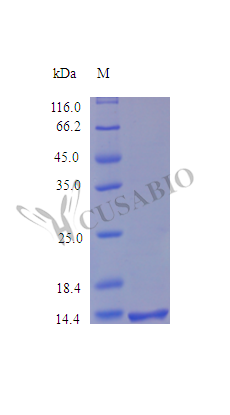Recombinant Human Syndecan-4 (SDC4) is produced in an E. coli expression system and spans amino acid region 19-145. This product comes without tags and achieves purity levels above 95% as verified by SDS-PAGE. The protein appears to retain full biological activity, which has been validated through its binding ability in functional ELISA tests. Endotoxin levels stay below 1.0 EU/μg, as determined by the LAL method, making it appropriate for various experimental applications.
Syndecan-4 functions as a transmembrane protein that plays a critical role in cell adhesion, migration, and proliferation through its interactions with the extracellular matrix. This protein participates in several cellular pathways, particularly those that regulate wound healing and tissue repair. Given its diverse functions, Syndecan-4 has become a significant focus for researchers exploring cell signaling and extracellular matrix interactions.
Potential Applications
Note: The applications listed below are based on what we know about this protein's biological functions, published research, and experience from experts in the field. However, we haven't fully tested all of these applications ourselves yet. We'd recommend running some preliminary tests first to make sure they work for your specific research goals.
1. Functional ELISA Development for Growth Factor Binding Studies
This recombinant SDC4 protein is highly suitable as a capture reagent in ELISA-based assays for studying binding interactions with various heparin-binding growth factors, including but not limited to bFGF. The confirmed biological activity and specific binding capability to bFGF (linear range 0.1-10 ng/ml) provide a solid foundation for quantitative binding studies. High purity (>95%) and low endotoxin levels make it appropriate for developing standardized binding assays. Researchers can use this protein to investigate the binding specificity and affinity of different growth factors (e.g., VEGF, FGF family members) to syndecan-4.
2. Antibody Development and Validation
The high purity and tag-free nature of this recombinant SDC4 protein make it an excellent immunogen for generating specific antibodies against human syndecan-4. The extracellular domain (19-145aa) represents the physiologically relevant region, and the confirmed biological activity suggests that the protein is properly folded, increasing the likelihood that the generated antibodies will recognize the native, functional form of SDC4 in biological samples. Researchers can use this protein in immunization protocols, antibody screening, and validation assays (e.g., ELISA, Western blot) without concerns about tag-related epitopes.
3. Protein-Protein Interaction Screening
This biologically active SDC4 protein can be used in interaction studies such as pull-down assays or surface plasmon resonance (SPR) to identify and characterize binding partners. Since the protein lacks a tag, immobilization may require alternative strategies (e.g., covalent coupling to chips or beads via amine groups). The demonstrated binding activity with bFGF validates its proper folding and functional conformation for interaction screens. Low endotoxin content minimizes interference in cell-based validation assays. Researchers can screen cell lysates or purified proteins for potential syndecan-4 interactors.
4. Biochemical Characterization of Syndecan-4 Function
The recombinant SDC4 protein allows for detailed biochemical analysis of syndecan-4's binding characteristics. Researchers can perform dose-response studies, kinetic binding analyses, and competition assays using the established bFGF binding protocol as a reference. High purity enables accurate protein quantification and reproducible experimental conditions. This protein is suitable for studying how environmental factors (e.g., pH, ionic strength) affect binding activity and stability, providing insights into syndecan-4 function.
Final Recommendation & Action Plan
This recombinant SDC4 protein is a high-quality, functionally validated reagent suitable for all proposed applications. The confirmed binding activity to bFGF ensures that it is properly folded and bioactive. For functional ELISA development (Application 1), researchers can immediately proceed with quantitative binding assays using various growth factors. For antibody development (Application 2), the tag-free nature makes it an ideal immunogen, and antibodies generated should be validated against native SDC4. For interaction studies (Application 3), alternative immobilization methods should be employed due to the lack of a tag, but the protein's activity supports reliable results. For biochemical characterization (Application 4), the protein is ready for detailed kinetic and stability studies. Overall, the low endotoxin level enhances its utility in cell-based assays. Researchers should note that while E. coli expression may lack some post-translational modifications, the extracellular domain appears functional, and findings should be corroborated with full-length protein or cellular models where necessary.




